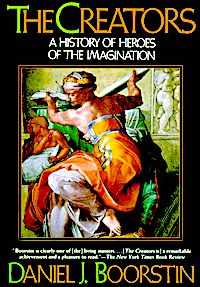

Tao Te Ching

Creators: Heroes of the Imagination
Most people have strong "herd instinct" genes that give allegiance and priority to conservative values: resisting change, constraining the new, and rejecting the stranger. This represent the polar opposite of the artistic spirit that forever seeks the creative, the new, the untried. Because artists have this openness and attraction to the unique and original, they often represent the cutting edge of not only artistic expression; but also, the influences that changes politics, culture, religion, and philosophy. In this book, Boorstin traces and describes these influences as expressed by our most influential creators of literature, sculpture, music, painting, architecture, drama, and dance.
Quotes from Creators: Heroes of the Imagination
“An antidote—and a complement—to the rigid moralism of the later Confucians and their state religion, Taoism became both an elevated philosophy and a popular religion.”
Chapters:
Comments: Click to comment
“As the centuries passed, the fragmentary teachings of Confucius were petrified into 'Confucianism.' The very word, which would have horrified Confucius, seems to have been invented about 1862 by European Christians to fit their simplistic view of the 'religions' of the non-Christian world.”
Chapters:
Comments: Click to comment
“Chaucer's Canterbury Tales, written in the last decade of his life, marks a surprising new vision, a work that would outshine all his others... [His] pilgrims are not merely 'representative,' each has a distinctive face and figure with his very own variety of impatience and enthusiasm... Chaucer himself is always there with self-disparaging comments, a slightly obtuse and puzzled witness to the human condition.”
Chapters:
Comments: Click to comment
“Chaucer's lively wit and unforgettable poetry gave to twice-told tales a new life... Chaucer's rich contribution to the human comedy... bears witness to the unconventional, and perhaps disreputable, character of his work... he wrote the first great poem in the English language in the interstices of a busy public life.”
Chapters:
Comments: Click to comment
“From about 1200 BCE and for 700 years until Plato's time, these two epics [the Iliad and the Odyssey] were the basis of Greek religion and morals, the chief source of history, and even of practical information... Still more remarkable, for 2500 years after Plato, the Homeric epics as primordial works of the imagination reigned over the Western world of letters. The core of humanistic scholarship, the songs of Homer resound without interruption above the changing dogmas of politics, religion, and science.”
Chapters:
Comments: Click to comment
“In time, the Taoist ways of thinking about man and nature were assimilated into the renewed Confucian theorizing by the great synthesizer Zhu Xi.”
Chapters:
Comments: Click to comment
“It was the Impressionists who made an art of instantaneous, and Claude Monet who showed how it could be done.”
Chapters:
Comments: Click to comment
“Perhaps Cervantes was the better equipped to provide his maquette for the modern novel because he was not especially reflective or deeply learned or philosophical. He was i love with the colors and moments and movements of life.”
Chapters:
Comments: Click to comment
“The Buddha had no answer to the riddle of creation. Much of his appeal to millions around the world for twenty-five hundred years came from his commonsense refusal to try to answer unanswerable questions.”
Chapters:
Comments: Click to comment
“The luminosity of their world impressed the Hindus from the beginning. Not the fitting-together-ness not the hierarchy of beings or the order of nature, but the blinding splendor, the Light of the World.”
Chapters:
Comments: Click to comment
“Unlike the Western world of surprising Creation, of man at war with nature; the world of Confucius transformed by Taoist and Buddhist currents saw man at home among transformations, procreations, and recreations.”
Chapters:
Comments: Click to comment
“Western religions begin with a notion that One—One God, One Book, One Son, One Church, One Nation under God—is better than many. The Hindu, dazzled by the wondrous variety of the creation, could not see it that way... the awestruck Hindus never came up with a single grand Creator-God... For so multiplex a world, the more gods the better!”
Chapters:
Comments: Click to comment
“Who was Homer? The ancient Greeks had no doubt that Homer was a real person... This so-called Homeric Question has provoked some of the bloodiest professorial battles. Speculation about Homer has itself spawned fantasies of epic proportions. Homer himself became a myth.”
Chapters:
Comments: Click to comment
Comments (0)